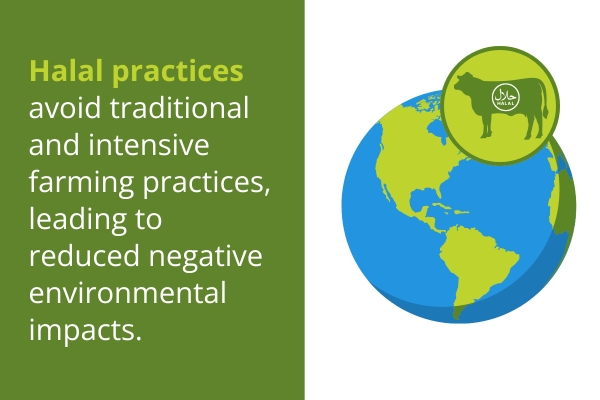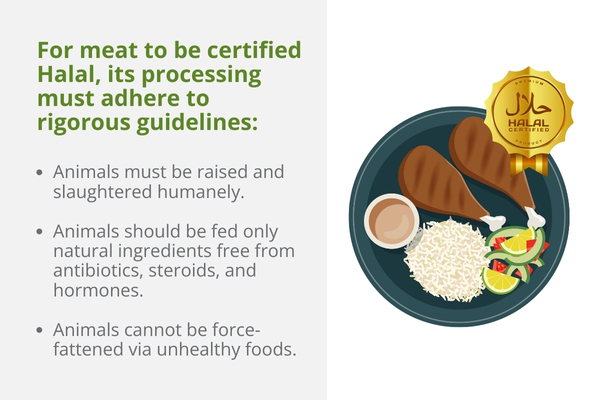April 26, 2024

Serving Halal-certified meats can elevate your customers’ dining experiences and enrich your existing menu. Not only does offering Halal foods offer dining options for those who have religious observances, but it also can expand your dining experience by ensuring ethical sourcing practices, introducing diners to new, exceptional flavors, and fostering a deeper connection between your establishment and conscientious consumers.
Read on for top reasons why Halal meat should make its way onto your next menu.
4 Reasons to Put Halal Meat on Your Menu
Adding Halal meat options to your menu has many benefits, including increasing your customer base.
1. Customers Crave Quality Ingredients
Halal meat is raised eating only the best natural feed, making for a flavorful product. Today’s customers are looking for exceptional food, and Halal delivers quality as meat should.
2. Guests Want Healthy Options
Healthy eating is a major trend among diners, and people are searching for satisfying yet nutritious options. In fact, 50 percent of American consumers aim to eat wholesomely.
Halal meats contain more vitamins and Omega-3 and less harmful fat than processed meats. They are also preservative-free and contain fewer antibiotics and hormones. Adding healthier meat options to your menu means capturing a broader customer base, despite someone's religious beliefs
3. Promotes Cultural Inclusivity
Our communities have a robust Muslim population. In fact, Islam is the third largest religion in the U.S. and, as of late 2017, has been home to 3.45 million Muslim Americans.
Serving certified halal meats and foods widens your consumer base and communicates that your restaurant values inclusivity and diversity.
4. Diners Want More Cruelty-Free and Sustainable Meat Options
Conventional meat farming can have significant environmental impacts. It is associated with nearly 60 percent of global greenhouse gas emissions. Halal practices, however, avoid traditional and intensive farming practices, leading to reduced negative environmental impacts.

Furthermore, Halal slaughtering methods promote more ethical treatments and aim to create a stress-free experience for the animals.
What are Halal Foods?
Halal food refers to food prepared according to Islamic dietary laws and approved for consumption. “Halal,” in Arabic, translates to “permissible or lawful.” Conversely, “Haram” foods are off-limits as they do not align with established dietary laws. Examples of Haram ingredients include pork and pork by-products, blood (such as blood sausage), foods containing animal rennet or pork gelatin, and alcohol.
On the other hand, Halal foods include a wide range of acceptable ingredients, including grains, fruits, vegetables, and certain meats. For meat to be certified Halal, its processing must adhere to rigorous guidelines:
- Animals must be raised and slaughtered humanely.
- Animals should be fed only natural ingredients free from antibiotics, steroids, and hormones.
- Animals cannot be force-fattened via unhealthy foods.
Read more about Halal-approved foods here.

Essentially, Halal meat must always meet the highest cleanliness, purity, and quality standards. For the Muslim community, Halal foods are crucial to its core religious beliefs. However, secular eaters who want to practice a healthy lifestyle and care about the quality of the meat they consume also seek Halal products, making Halal products inviting to all.
Main Benefits of Serving Halal-Certified Meats
Halal diets have far-reaching health and ethical benefits. First and foremost, halal animals are fed only grass and vegetarian feed. This enhances the flavor and the amount of vitamins, Omega-3 fats, and antioxidants. Second, the slaughtering process is designed to reduce pain and harm to the animal. Lastly, all processes and packing are incredibly hygienic, mitigating the risk of cross-contamination.
Best Practices for Showcasing Halal Foods
No matter the reason you choose to offer Halal foods on your menu, you’ll want to keep three things in mind:
- Display the Halal certification symbol on your menus to let guests know which items meet the criteria.
- Train your staff on the difference between Halal and Haram ingredients.
- Offer Halal-approved plant-based entrees, featuring legumes as an alternative to non-halal meat.
Halal Meats and More from US Foods CHEF’STORE
US Foods CHEF'STORE stocks premium Halal meat from lamb chops to goat, beef, and more at competitive prices. Our shelves are lined with fresh produce, whole grains, dried legumes, and spices to make exciting plant-based dishes.
Visit us today and see why restaurant owners have made us their go-to for all their needs.